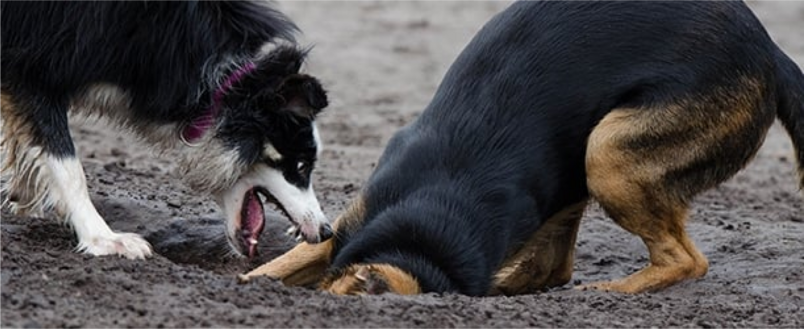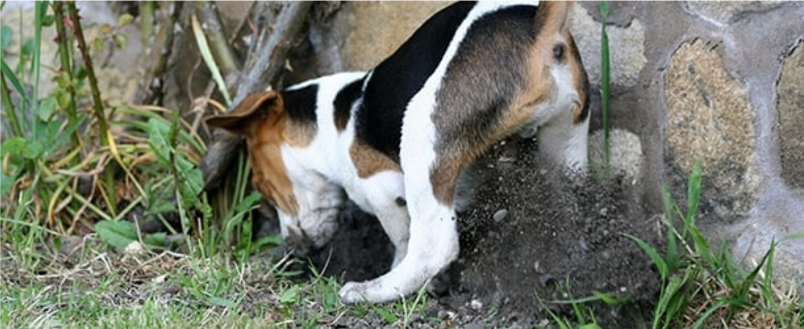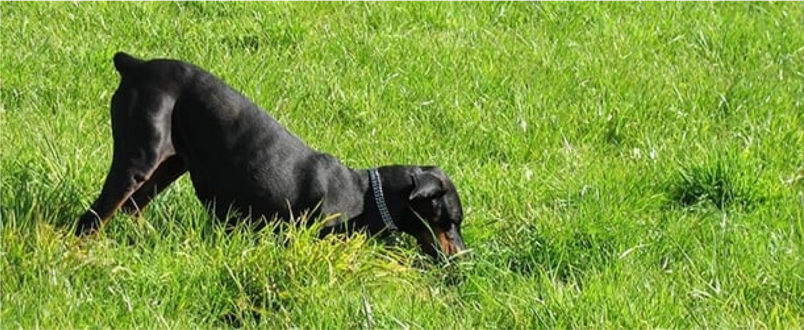Last Updated: 07/05/2025
Dog Digging: Causes & Solutions
Have you ever wondered why dogs dig? Read more from our vet team about what drives this behaviour and how to deter them.
Author: Dr Teagan Lever BVSc (Hons)
Reading Time: 1 minute - quick read

When Carla isn't talking about petcare at PetCircle, she enjoys playing mum to her fluffy little cross-eyed feline fur baby, Smudge.
dog behaviour, digging, destructive behaviour, anxiety, dog health, dog toys, kennels

Is your yard starting to resemble the surface of the moon? A dog that digs is never easy to deal with if you value your lawn and plants. So why do dogs dig and how can you solve the problem?
Some types of dogs like Terriers or Beagles are simply born diggers as the trait has been selectively chosen over generations of breeding. Digging is also most common in puppies and adolescent dogs due to their extra energy. Younger dogs usually require much more stimulation and are still learning what behaviour is acceptable.

TIP: You can create a "digging zone" in a sectioned area of your yard or even make one in a kid's shell pool. Dogs are generally more attracted to freshly turned soil so try filling this area with loose dirt or even sand. You can help your dog to understand that this is an acceptable digging area by burying toys or rawhide treats for them to find. Make other areas you don't want them digging in unappealing and inaccessible by placing rocks or fencing around it. Praise your dog and feed them treats when they use the designated digging zone. If they do try to dig in another area, redirect them to their area and reward them when they dig there instead.
Aside from instinct, what else causes digging?
Insufficient Stimulation

The leading cause of "bad" behaviour in dogs is caused by a lack of adequate exercise. Loneliness and boredom will also cause these behaviours and while any dog will suffer depression from lack of mental stimulation, highly intelligent dogs like Border Collies and Labradors are more susceptible.
Dogs should be walked twice daily to expend energy as well as bond with you. If your dog is left outside or alone for long periods of time, make sure you spend time with them in addition to their exercise by playing or practising commands. If leaving your pet alone is inevitable, make sure they have multiple toys to play with including treat toys like the Kong Wobbler.
Insufficient Shelter

Dogs will use their digging skills to protect themselves from the elements. On hot days they may dig holes to lie in the cooler dirt. Dogs may also dig holes to find shelter from cold, frosty or windy weather. If your dog often lies in holes or digs under the shade of a certain tree, it may be that they are digging for shelter. Make sure that your pooch has access to a dog house and bed that are protected from sun, wind and rain. In extremely cold or hot conditions, consider leaving your dog indoors for the day.
Anxiety and Stress

Dogs that are experiencing anxiety can often develop behaviours like digging, chewing or inappropriate elimination. See our guides for helping your dog with thunderstorm anxiety, separation anxiety, moving into a new home and introducing new pets to the family.
Products like the ThunderShirt or Adaptil range have shown to be effective in many homes. The ThunderShirt applies a constant pressure to help lower blood pressure and reduce fear or stress. Adaptil products use synthetic pheromones to calm anxious pets. See our guide to using Adaptil for more information.
Trying to Escape

If your are finding holes are being dug exclusively near your fence line, your dog may be trying to dig their way out. Escape attempts can be linked to an anxiety disorder like separation anxiety or to a fear like thunderstorm phobia. Placing large rocks along the fenceline can help deter this behaviour but you will also need to address the underlying issue, and help your pet work through the anxiety.
Your dog may also want to escape your yard because there is something more exciting on the other side (such as a viable mate!).
Trying to catch or hunt something

If you notice your dog is digging tracks or around tree and shrub roots, they may be after a critter or insect. Never use pesticides or rat bait in areas your dog can access. Consider more humane methods of catching or deterring pests in your yard, because although uncommon, dogs can get secondary poisoning from eating mice or rats killed with poison.
If your dog likes digging, make the areas you want them kept out from inaccessible and unappealing by placing rocks or fencing around them. Create your dog their own digging zone to let them satisfy the urge and make sure dog gets adequate exercise and attention throughout the day. If you must leave your dog alone for long periods of times, make sure they have enough toys and access to shelter.